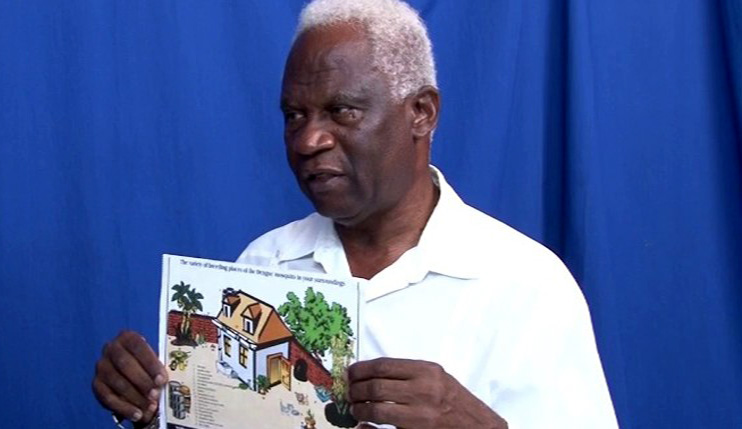Basseterre, St. Kitts, June 23, 2016 (SKNIS): Retired entomologist Dr. Sam Rawlins has emphasized that every individual has a key role to play in the elimination of the aedes aegypti mosquito, which is responsible for transmitting the zika virus from one individual to another.
“For effective control, there is need for mobilizing the community to participate in source reduction,” he said. “All sectors need to become involved, the public and private.”
“It’s not just a government thing; all of us have a vested interest in this because if your children are going to become infected with dengue or chikungunya or zika, you would not be very happy,” Dr. Rawlins said. “If everybody in our household becomes agents of search and destroy,… your duty now is to go and search around our environment for all these habitats. Now if every householder did that, then the mosquitoes breeding next door, wouldn’t come over the wall and come into your yard, although you’re doing the right thing, and bite you. You would be eliminating them over there, while you’re doing it over here.”
The call to action is depicted in a poster designed by Dr. Rawlins who worked at the Regional Virus Laboratory that later became the Caribbean Epidemiology Centre (CAREC) and then at the Centres for Disease Control in North Colorado, USA. He said that the message on the poster is: “without habitats there is no aedes aegypti, without aedes aegypti there is no dengue fever – eliminate the habitats around your home.” It was emphasized that while the poster had been created in response to a dengue outbreak, it can apply to the chikunguna and zika viruses as well because the same mosquito is involved.
The former entomologist identified three methods of mosquito control in general. Removing, emptying or filling up all water receptacles within one’s environment, chemical control and personal protection. He explained that water receptacles can range from flower pots and discarded shoes to water barrels and plants whose parts can hold water.
“Anything that holds water especially, in fact this mosquito prefers clean water,” Dr. Rawlins said, noting that gutters along the roof can become breeding sites. “It means that the water won’t run off and mosquitoes can breed right there in that, laundry tanks, uncovered tanks. We found that in Trinidad and Tobago, most barrels and buckets and drums were the best habitats, home for mosquitoes.”
“So if you have these barrels around the home as in every Caribbean country, aedes aegypti (mosquitoes) would love to go and lay their eggs in there. When the water rises enough, you have an explosion of hatching of eggs.”
The lifecycle of the mosquito would then continue with larvae (wrigglers), pupa and adult. The cycle would begin again once the female received a blood meal that would provide the protein required for the development of the eggs. He said the key to keeping mosquitoes out of containers that are used to collect water is to keep them covered.
Dr. Rawlins further noted that another less effective method of mosquito elimination is chemical control, which includes fogging as well as putting temephos which has the brand name of abate in water containers.
Personal protection was also identified as a third method of mosquito eradication. This was said to include using mosquito repellant as well as wearing long sleeves and long pants.





